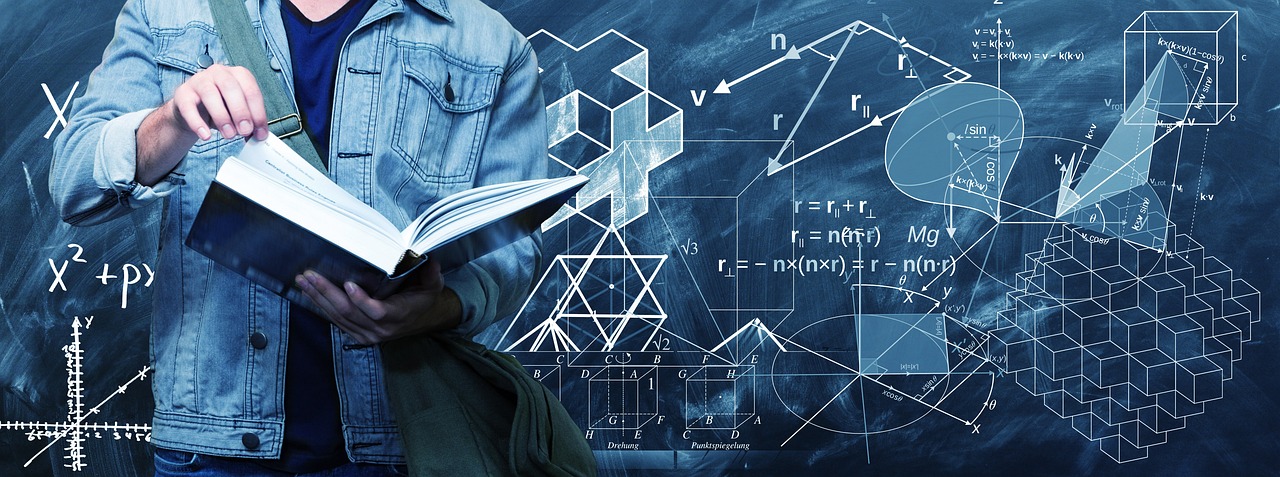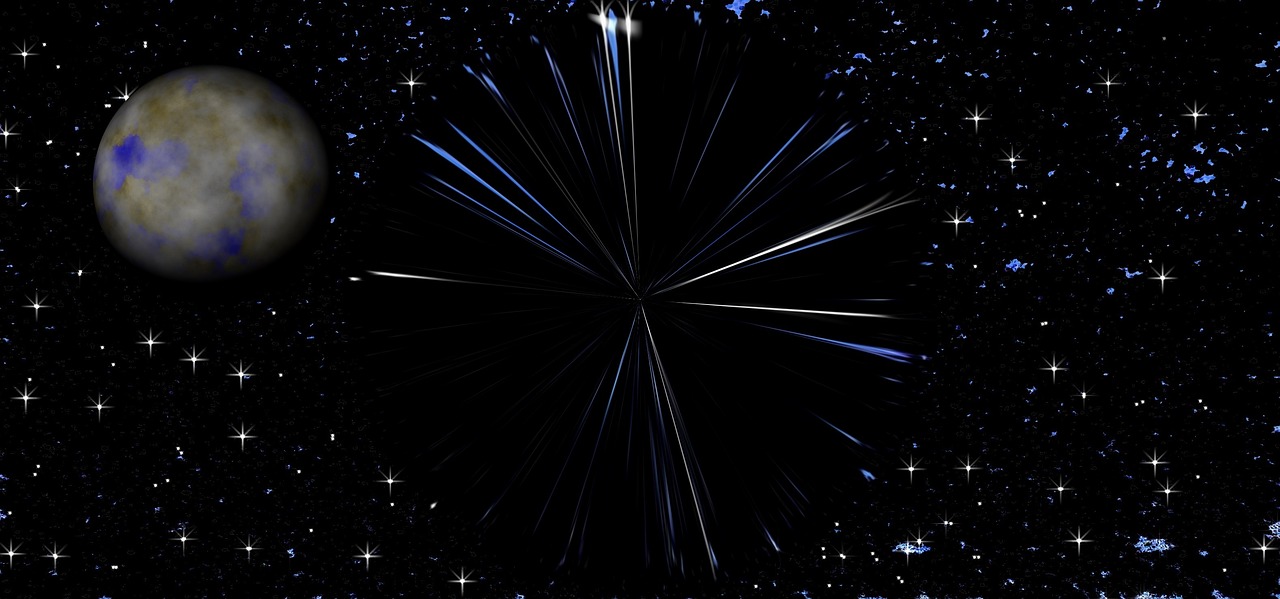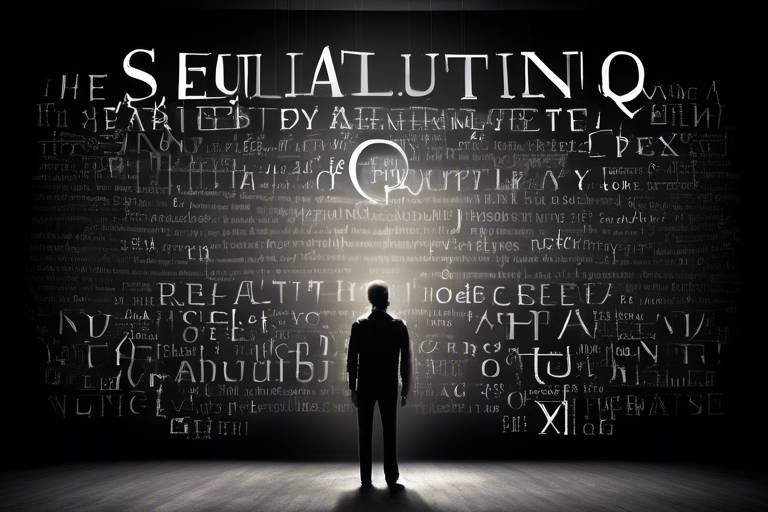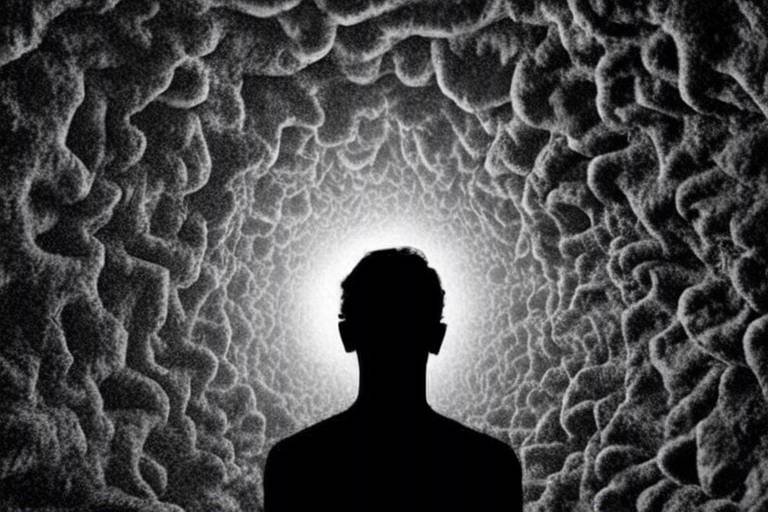Questioning Reality - The Interplay of Philosophy and Quantum Theory
Have you ever found yourself staring at the night sky, pondering the vastness of the universe and your place within it? The intertwining of philosophy and quantum theory invites us to engage in such profound reflections. As we delve into this captivating relationship, we uncover layers of meaning that challenge our understanding of reality and existence. Philosophy has long been the arena for exploring the fundamental questions of life, while quantum theory, with its perplexing principles, provides a scientific framework that often seems to defy logic. Together, these disciplines create a rich tapestry of inquiry that compels us to reconsider what we think we know.
At the heart of this exploration lies a question that has haunted thinkers for centuries: What is the nature of reality? Is it a fixed entity, or is it fluid and ever-changing? Quantum theory introduces us to concepts like superposition and entanglement, which challenge our classical understanding of the universe. Imagine a world where particles can exist in multiple states simultaneously, or where two particles can remain connected across vast distances, influencing one another instantaneously. These phenomena not only boggle the mind but also echo philosophical inquiries about the interconnectedness of existence.
As we embark on this intellectual journey, we will examine how philosophical inquiry has shaped our interpretation of quantum mechanics. From the historical perspectives of great thinkers like René Descartes and Immanuel Kant to modern interpretations of the observer effect and quantum entanglement, we will see how each layer of thought influences our understanding of reality. Are we mere observers in a predetermined universe, or do our perceptions actively shape the fabric of existence? The answers may not be straightforward, but the dialogue between philosophy and quantum theory offers a compelling narrative that invites us to question everything.
In this article, we will explore various dimensions of this interplay, diving into the philosophical implications of quantum phenomena. We will consider the observer effect and its impact on our perception of reality, the complexities of quantum entanglement, and the challenges posed by quantum superposition. Each section will not only illuminate the scientific principles at play but also provoke thoughtful reflection on the nature of existence itself. So, buckle up as we navigate through the fascinating world where philosophy meets quantum theory, and prepare to have your understanding of reality turned upside down!
- What is quantum theory? Quantum theory is a fundamental theory in physics that describes the physical properties of nature at the scale of atoms and subatomic particles. It challenges classical mechanics by introducing concepts such as superposition and entanglement.
- How does philosophy relate to quantum mechanics? Philosophy explores fundamental questions about existence, knowledge, and reality, which are also central to quantum mechanics. The two fields intersect in their inquiries about the nature of reality and the role of observation.
- What is the observer effect? The observer effect refers to changes that the act of observation can make on a phenomenon being observed, especially in quantum mechanics. It raises questions about the role of consciousness in shaping reality.
- Why is quantum entanglement significant? Quantum entanglement suggests that particles can become interconnected in ways that classical physics cannot explain, leading to philosophical discussions about determinism, interconnectedness, and the nature of reality.

The Philosophical Foundations of Quantum Theory
Understanding the philosophical underpinnings of quantum theory reveals how concepts like uncertainty and duality challenge traditional notions of reality and encourage deeper inquiry into the nature of existence. At its core, quantum theory isn't just a set of mathematical equations; it’s a profound invitation to rethink what we believe about the universe. Imagine standing on the edge of a vast ocean, where each wave represents a different possibility of existence. This is the world of quantum mechanics—where particles can exist in multiple states at once, much like how we might feel a mix of emotions at any given moment.
One of the most striking philosophical implications of quantum theory is the idea that our understanding of reality is not as solid as we might think. The classical view of the universe is akin to a well-ordered library, where every book is neatly placed on a shelf, each representing a specific fact about the world. However, quantum mechanics introduces a chaotic library where books can be both present and absent, existing in a state of flux until someone decides to open one and take a look. This brings us to the concept of superposition, which suggests that particles can be in multiple states simultaneously until observed. This idea not only shakes the foundations of physics but also raises questions about our perception of reality itself.
Moreover, the philosophical implications of quantum theory extend into the realm of determinism versus indeterminism. In classical physics, the universe operates like a giant clockwork mechanism—if you know the initial conditions, you can predict the future precisely. But quantum mechanics throws a wrench into this predictability. It suggests that at a fundamental level, the universe is inherently unpredictable, challenging our understanding of causality and free will. Are we merely observers in a predetermined universe, or do our actions influence the very fabric of reality? These questions echo throughout history, from ancient philosophical debates to modern scientific inquiries.
As we delve deeper into these concepts, it’s essential to recognize that the philosophical foundations of quantum theory are not isolated from other areas of thought. They intersect with ethics, metaphysics, and even our daily lives. For instance, if reality is not a fixed entity, how does that change our approach to moral decisions? This interplay between philosophy and quantum theory encourages us to embrace uncertainty and complexity, much like navigating a winding path through a dense forest where each turn reveals a new perspective.
In summary, the philosophical foundations of quantum theory challenge us to reconsider our assumptions about reality. They invite us to explore the intricate dance between observation and existence, urging us to question the very nature of what it means to be alive in a universe that is as mysterious as it is beautiful. As we continue to unravel these complexities, we may find that the answers we seek are not as important as the questions we dare to ask.
- What is quantum theory? Quantum theory is a fundamental theory in physics that describes the physical properties of nature at the scale of atoms and subatomic particles.
- How does quantum theory relate to philosophy? Quantum theory raises profound philosophical questions about the nature of reality, observation, and existence, challenging traditional views of determinism and objectivity.
- What is superposition in quantum mechanics? Superposition is a principle in quantum mechanics where a particle can exist in multiple states at once until it is observed or measured.
- What are the implications of quantum entanglement? Quantum entanglement suggests that particles can be interconnected in ways that defy classical physics, leading to discussions about the nature of reality and locality.

The Observer Effect: A Philosophical Dilemma
The observer effect in quantum mechanics is not just a quirky scientific phenomenon; it serves as a profound philosophical conundrum that challenges our very understanding of reality. Imagine you’re peeking into a magical box that holds secrets of the universe. The moment you look inside, the contents change. This is somewhat analogous to the observer effect, where the act of observation alters the state of what is being observed. It raises the question: does reality exist independently of our observation, or is it shaped by our consciousness?
At the core of this dilemma lies the interplay between consciousness and reality. When we observe a quantum particle, we are not merely passive spectators; our act of measurement influences its state. This leads to philosophical debates that delve into the nature of perception, knowledge, and existence itself. Are we merely observers in a universe that exists in a fixed state, or are we active participants in the creation of reality? This question echoes through the corridors of both philosophy and science, prompting a reevaluation of what we consider to be 'real.'
One of the most intriguing aspects of the observer effect is its historical backdrop. Thinkers like René Descartes and Immanuel Kant grappled with similar questions about perception and reality long before the advent of quantum mechanics. Descartes famously stated, "I think, therefore I am," suggesting that our awareness is fundamental to our existence. In the quantum realm, this notion takes on a new dimension, as the act of thinking—or observing—can fundamentally change the state of a particle. Kant, on the other hand, proposed that our understanding of reality is limited by our perceptions, which aligns closely with the implications of the observer effect.
Moreover, the observer effect invites us to consider the implications of knowledge and perception. If our observations can alter the state of reality, then how can we trust our understanding of the universe? This philosophical dilemma is akin to a funhouse mirror, distorting our perception of reality and forcing us to question the very nature of truth. As we delve deeper into quantum mechanics, we find ourselves in a labyrinth of uncertainty where traditional logic breaks down.
In summary, the observer effect is not merely a scientific curiosity; it is a philosophical dilemma that compels us to rethink our assumptions about reality. It challenges us to consider the role of consciousness in shaping the universe and invites us to explore the intricate relationship between observation and existence. As we continue to unravel the mysteries of quantum mechanics, we must also engage with the philosophical questions that arise, for in doing so, we may gain a deeper understanding of not only the universe but also our place within it.
- What is the observer effect? The observer effect refers to changes that the act of observation can make on a phenomenon being observed, particularly in quantum mechanics.
- How does the observer effect relate to consciousness? The observer effect raises questions about whether consciousness plays a role in shaping reality, suggesting that our observations may influence the state of what we observe.
- What are the philosophical implications of the observer effect? It challenges traditional notions of reality, perception, and knowledge, prompting a reevaluation of how we understand existence.

Historical Perspectives on Observation
The concept of observation has been a cornerstone of both philosophical and scientific inquiry for centuries. Philosophers such as René Descartes and Immanuel Kant laid the groundwork for understanding how our perception shapes reality. Descartes, often regarded as the father of modern philosophy, famously posited "Cogito, ergo sum" ("I think, therefore I am"). This assertion underscores the importance of doubt and inquiry, suggesting that the act of thinking and observing is fundamental to existence itself. His method of systematic skepticism encouraged questioning the very nature of reality, a theme that resonates deeply with quantum mechanics, where observation plays a pivotal role in determining the state of a system.
Kant, on the other hand, introduced the idea that our understanding of the world is constrained by the limits of human perception. He argued that we can never know the "thing-in-itself," or the true nature of reality, but only how it appears to us through our senses. This perspective is particularly relevant when discussing the observer effect in quantum mechanics, where the act of measurement alters the state of what is being observed. Kant’s work challenges us to consider how our perceptions shape not just our understanding of reality, but the reality itself.
Throughout history, the interplay between observation and reality has evolved. For instance, consider the transition from classical physics to quantum mechanics. In classical physics, objects were thought to exist independently of observation, governed by deterministic laws. However, the advent of quantum theory revealed a more complex relationship, where particles exist in a state of superposition until observed. This shift has profound implications for how we understand existence and the role of the observer in shaping reality.
The historical perspectives on observation reveal a rich tapestry of thought that continues to influence contemporary discussions in both philosophy and science. The following table summarizes key thinkers and their contributions to the philosophy of observation:
| Philosopher | Key Contribution |
|---|---|
| René Descartes | Introduced systematic skepticism; emphasized the role of doubt in understanding reality. |
| Immanuel Kant | Argued that perception limits our understanding of the true nature of reality. |
| David Hume | Challenged the notion of causality; suggested that our understanding of cause and effect is based on habit rather than reason. |
| Heisenberg | Formulated the Uncertainty Principle; highlighted the limitations of measurement in quantum mechanics. |
As we delve deeper into the quantum realm, it becomes evident that the historical perspectives on observation are not merely academic; they hold significant implications for our understanding of existence itself. The questions raised by these thinkers invite us to reconsider our assumptions about reality, perception, and the very nature of knowledge. In a world where observation can alter the state of reality, the philosophical implications are as vast as the universe itself.
- What is the observer effect in quantum mechanics? The observer effect refers to changes that the act of observation can make on a quantum system. This means that merely observing a particle can influence its behavior.
- How did Descartes influence modern philosophy? Descartes' emphasis on doubt and inquiry laid the foundation for modern scientific methods and philosophical skepticism, encouraging deeper examination of reality.
- What did Kant mean by the "thing-in-itself"? Kant suggested that while we can perceive objects, we can never truly know their essence or true nature, as our understanding is limited by our sensory experiences.
- Why is quantum entanglement significant? Quantum entanglement challenges classical notions of separability and locality, suggesting that particles can be interconnected regardless of distance, which raises profound philosophical questions about reality.

Descartes and the Nature of Reality
René Descartes, often hailed as the father of modern philosophy, revolutionized the way we think about existence and reality. His famous dictum, "Cogito, ergo sum" (I think, therefore I am), encapsulates the essence of his philosophy, emphasizing the importance of doubt and inquiry as pathways to understanding. Descartes approached the nature of reality with a skeptical lens, questioning everything he believed to be true until he arrived at undeniable certainties. This method of systematic doubt lays a foundation that resonates deeply with contemporary interpretations of quantum mechanics, particularly in the context of the observer effect.
In Descartes' view, reality is not simply what we perceive with our senses; rather, it is a complex interplay of thought and existence. He posited that the act of thinking itself is proof of one’s existence, which leads to profound implications in the realm of quantum theory. Just as Descartes sought to differentiate between the mind and body, quantum mechanics challenges the boundaries between observation and reality. The observer effect suggests that the act of measuring or observing a quantum system fundamentally alters its state, echoing Descartes' assertion that our perception shapes our understanding of reality.
This brings us to a pivotal question: if our observations can influence reality, what does that mean for our understanding of existence? Descartes might argue that while we can doubt the external world, the certainty of our thoughts remains unassailable. This tension between perception and reality is not just a philosophical conundrum; it mirrors the duality found in quantum mechanics, where particles exist in multiple states until observed. In this sense, Descartes' philosophy not only informs our approach to existential questions but also parallels the intricate dance of particles in the quantum realm.
Furthermore, Descartes' emphasis on rationalism invites us to consider the limits of human understanding. He believed that through reason, we could attain knowledge about the world. However, as quantum theory reveals, the universe operates on principles that often defy classical logic. For instance, the concept of superposition, where particles can exist in multiple states at once, challenges the very foundation of how we define reality. Descartes' philosophical inquiries compel us to confront these complexities and reconsider our assumptions about existence.
In summary, Descartes' exploration of reality through doubt and reason provides a rich framework for engaging with the philosophical implications of quantum mechanics. His ideas encourage us to question not just the nature of reality but also our role as observers within it. As we delve deeper into the mysteries of existence, we find that the interplay between philosophy and quantum theory continues to shape our understanding of the universe in profound and unexpected ways.
- What is Descartes' main contribution to philosophy? Descartes introduced the method of systematic doubt, emphasizing the importance of questioning beliefs to arrive at certain knowledge.
- How does Descartes' philosophy relate to quantum mechanics? Both challenge traditional notions of reality; Descartes through doubt and reasoning, and quantum mechanics through concepts like the observer effect.
- What does "Cogito, ergo sum" mean? It translates to "I think, therefore I am," highlighting the certainty of one's existence through the act of thought.
- Why is the observer effect significant? It suggests that the act of observation can influence the state of a quantum system, raising philosophical questions about the nature of reality.

Kant's Influence on Perception
Immanuel Kant, a towering figure in the realm of philosophy, profoundly shaped our understanding of perception and its role in constructing reality. His ideas, articulated in works such as the "Critique of Pure Reason," suggest that our experiences are not merely reflections of the external world but are instead shaped by the innate structures of our mind. Kant proposed that we can only know the world as it appears to us, which he termed the "phenomenon," while the "noumenon," or the thing-in-itself, remains ultimately inaccessible. This distinction raises significant questions about the nature of reality itself. Are we merely observers in a universe that exists independently of our perception, or is our understanding of reality intrinsically tied to the way we perceive it?
Kant's philosophy posits that our perception is filtered through categories of understanding, such as space and time, which are not inherent properties of the external world but rather frameworks through which we interpret our experiences. This leads to the intriguing idea that reality, as we know it, is a construct of both the external stimuli we encounter and the cognitive faculties we possess. In this light, Kant's influence extends beyond mere philosophical inquiry; it intertwines with the very fabric of scientific exploration, particularly in the context of quantum theory.
Moreover, Kant's emphasis on the limitations of human understanding resonates deeply with the implications of quantum mechanics. Just as Kant argued that our knowledge is constrained by our perceptual apparatus, quantum theory suggests that our grasp of reality is limited by the principles of uncertainty and superposition. This notion invites us to consider whether our attempts to understand the quantum realm are inherently flawed, as we may be trying to apply classical logic to a reality that operates on fundamentally different principles.
To illustrate Kant's influence on perception, consider the following key points:
- Phenomenon vs. Noumenon: Kant's distinction highlights the difference between what we can observe and what exists independently of our perception.
- Categories of Understanding: Our experiences are shaped by innate cognitive structures, which influence how we interpret reality.
- Limitations of Knowledge: Kant argues that our understanding is inherently limited, paralleling the challenges faced in quantum mechanics.
In summary, Kant's insights into perception compel us to rethink our assumptions about reality. They challenge us to acknowledge that our knowledge is not just about discovering external truths but also about understanding the mechanisms of our own perception. This philosophical lens provides a rich context for grappling with the complexities of quantum theory, where the act of observation itself seems to play a pivotal role in shaping the very fabric of reality.
Q: What is the difference between phenomenon and noumenon in Kant's philosophy?
A: The phenomenon refers to the world as we perceive it, shaped by our senses and cognitive faculties, while the noumenon is the reality that exists independently of our perception, which we cannot fully know or experience.
Q: How does Kant's philosophy relate to quantum mechanics?
A: Kant's ideas about the limitations of human understanding and the role of perception resonate with quantum mechanics, where the act of observation influences the state of particles, challenging traditional notions of reality.
Q: Why is perception important in understanding reality?
A: Perception is crucial because it shapes our experiences and understanding of the world. Kant argued that our cognitive structures filter and interpret sensory information, meaning that our grasp of reality is fundamentally linked to how we perceive it.

Modern Interpretations of the Observer Effect
The observer effect in quantum mechanics has evolved significantly since its inception, sparking a myriad of interpretations that challenge our understanding of reality. In modern quantum theory, the act of observation is not merely a passive act of witnessing; it becomes an active participant in shaping the outcome of an experiment. This notion has led to fascinating discussions among physicists and philosophers alike, prompting questions about the very nature of consciousness and its role in the universe. Imagine standing by a river, watching the water flow. Your mere presence influences the ripples, changing the way the water behaves. Similarly, in quantum mechanics, the observer alters the state of what is being observed.
One of the most prominent interpretations today is the Copenhagen interpretation, which posits that particles exist in a state of probability until they are observed. This means that reality is not fixed; rather, it becomes defined through the act of measurement. The implications are profound: if our observation can influence reality, what does that say about our understanding of existence? Are we mere spectators, or do we play an integral role in the unfolding of the universe?
Another significant interpretation is the Many-Worlds Interpretation, which suggests that every possible outcome of a quantum event actually occurs, but in separate, branching universes. This idea radically shifts the way we think about choice and consequence. In this framework, every time a measurement is made, the universe splits into multiple realities, each reflecting a different outcome. It’s as if every decision we make creates a new path in a vast, sprawling forest of possibilities. This raises even more philosophical questions: If all outcomes exist simultaneously, what does that mean for free will? Are we truly making choices, or are we simply navigating a pre-existing landscape of infinite realities?
Moreover, the de Broglie-Bohm theory, also known as pilot-wave theory, offers a deterministic view of quantum mechanics, suggesting that particles have definite positions and velocities at all times, guided by a "pilot wave." This interpretation challenges the conventional understanding of randomness in quantum mechanics and reintroduces the idea of determinism. It compels us to reconsider our assumptions about chaos and order in the universe, suggesting that beneath the apparent randomness lies a deeper, hidden structure.
In contemporary discussions, the observer effect also invites us to explore the philosophical implications of consciousness itself. Some theorists argue that consciousness is not just a byproduct of the brain but a fundamental component of the universe, intertwined with the fabric of reality. This leads to a fascinating intersection of science and spirituality, where ancient philosophical questions about the nature of existence are revisited in light of modern scientific discoveries.
As we delve deeper into the quantum realm, the observer effect continues to challenge our perceptions and understanding of reality. It serves as a reminder that the universe is far more complex and interconnected than we might initially believe. The implications of our observations extend beyond the laboratory, inviting us to reflect on our role in the cosmos and the nature of existence itself.
- What is the observer effect in quantum mechanics? The observer effect refers to changes that the act of observation can make on a quantum system, suggesting that measurement influences the state of a particle.
- How does the Copenhagen interpretation explain the observer effect? The Copenhagen interpretation posits that a quantum system exists in a state of probability until it is measured, at which point it assumes a definite state.
- What is the Many-Worlds Interpretation? This interpretation suggests that all possible outcomes of a quantum event occur in separate, branching universes, leading to a vast multiverse of realities.
- Can consciousness influence quantum mechanics? Some theories propose that consciousness plays a fundamental role in shaping reality, raising profound questions about the nature of existence.

Quantum Entanglement and Its Philosophical Implications
Quantum entanglement is one of the most mind-boggling phenomena in the realm of quantum mechanics, and it poses significant philosophical questions about the nature of reality. When two particles become entangled, the state of one particle instantaneously influences the state of the other, regardless of the distance separating them. This peculiar connection challenges our classical understanding of separability and locality, leading us to reconsider fundamental concepts like interconnectedness and determinism.
Imagine a pair of gloves: if you find one glove, you immediately know the type of the other, even if it’s far away. This analogy illustrates how entangled particles behave; knowing the state of one gives you instant knowledge about the other. However, unlike gloves, these quantum particles exist in a state of superposition until measured, making the very act of observation a critical factor in determining their state. This leads to profound philosophical inquiries: Does the act of observation create reality? Or does reality exist independently of our perception?
The implications of quantum entanglement extend beyond physics into the realm of philosophy, where concepts of interconnectedness are explored. In a universe where particles are intertwined at a fundamental level, the idea that everything is separate and distinct begins to crumble. This interconnectedness suggests a reality that transcends traditional boundaries of space and time, prompting questions about the very fabric of existence. Are we all, in some way, connected through the quantum realm? This idea resonates deeply with various philosophical traditions that emphasize unity and interconnectedness among all things.
Furthermore, the debate between determinism and indeterminism is reignited by the phenomenon of entanglement. If entangled particles can influence one another instantaneously, does that imply a predetermined universe where every action is connected? Or is there room for randomness and free will? The implications of these questions are vast, affecting not just our understanding of physics but also our concepts of morality, choice, and responsibility. For instance, if our choices are influenced by entangled states, do we bear the same responsibility for our actions?
In conclusion, quantum entanglement serves as a powerful reminder that our understanding of reality is still evolving. It invites us to question our assumptions and explore the depths of interconnectedness and the nature of existence itself. As we delve deeper into the quantum realm, we may find that the lines between philosophy and science blur, leading to a richer understanding of the universe and our place within it.
- What is quantum entanglement? Quantum entanglement is a phenomenon where two particles become interconnected in such a way that the state of one particle instantly influences the state of the other, regardless of the distance between them.
- How does quantum entanglement challenge classical physics? It challenges classical physics by defying the traditional notions of separability and locality, suggesting that particles can be linked in ways that classical theories cannot explain.
- What are the philosophical implications of entanglement? The implications include questions about interconnectedness, determinism vs. indeterminism, and the nature of reality, prompting us to reevaluate our understanding of existence and consciousness.

Interconnectedness in Quantum Mechanics
The concept of interconnectedness in quantum mechanics is not just a scientific principle; it’s a profound philosophical idea that challenges our conventional understanding of reality. Imagine a spider web, where each thread is a particle, and every time you touch one thread, the entire web vibrates. This analogy captures the essence of quantum entanglement, where particles become intertwined in such a way that the state of one instantly influences the state of another, regardless of the distance separating them. This phenomenon raises intriguing questions: Are we all connected in ways we cannot yet comprehend? Does this suggest a deeper fabric of reality that binds everything together?
At the heart of this interconnectedness lies the idea that the universe is not a collection of isolated entities, but rather a complex network of relationships. When we observe an entangled particle, we are not merely observing a singular event; we are engaging with a system that transcends the boundaries of space and time. This realization invites us to reconsider our perception of individuality and separateness. In a sense, quantum mechanics encourages us to view reality as a tapestry woven from countless interactions, where the threads of existence are interdependent.
Moreover, this interconnectedness prompts a reevaluation of our understanding of causality. In classical physics, we often think of cause and effect as linear and predictable. However, quantum mechanics introduces a more intricate picture. For instance, when two particles become entangled, a change in the state of one particle can instantaneously affect the other, regardless of the distance that separates them. This challenges our traditional notions of determinism and suggests that the universe operates on principles that are far more complex than we initially believed.
To further illustrate this interconnectedness, consider the following table that summarizes key aspects of quantum entanglement and its implications for our understanding of reality:
| Aspect | Description |
|---|---|
| Entanglement | Particles become correlated in such a way that the state of one particle affects the state of another, regardless of distance. |
| Non-locality | Changes to one particle can instantaneously influence another particle, challenging classical views of space and time. |
| Interconnectedness | The universe is perceived as a network of relationships, where every entity is linked to others in complex ways. |
| Philosophical Implications | This interconnectedness raises questions about individuality, causality, and the nature of existence itself. |
In conclusion, the concept of interconnectedness in quantum mechanics serves as a powerful reminder that reality is far more intricate than it appears. It challenges us to look beyond the surface and explore the deeper connections that bind us to the universe and to each other. As we continue to delve into the mysteries of quantum theory, we may find that the answers we seek lie not only in mathematical equations but also in the profound relationships that define our existence.
- What is quantum entanglement? Quantum entanglement is a phenomenon where two or more particles become linked, so that the state of one particle instantly influences the state of the other, regardless of the distance between them.
- How does interconnectedness relate to our understanding of reality? Interconnectedness suggests that all entities in the universe are part of a complex network, challenging our notions of individuality and separateness.
- Can quantum mechanics explain consciousness? While quantum mechanics raises intriguing questions about the nature of consciousness, it remains a topic of ongoing philosophical and scientific debate.

Determinism vs. Indeterminism
When we delve into the realm of quantum mechanics, we stumble upon a profound debate that has captivated philosophers, scientists, and curious minds alike: the clash between determinism and indeterminism. At its core, determinism posits that every event or state of affairs, including every human action, is the outcome of preceding events in accordance with the natural laws. In contrast, indeterminism suggests that not all events are determined by prior states, allowing for randomness and unpredictability in the universe.
This dichotomy raises compelling questions about the nature of reality and our place within it. If the universe operates under deterministic principles, does that mean our choices are merely illusions, preordained by a complex web of prior events? On the other hand, if indeterminism holds true, it opens the door to the possibility of free will, where individuals can influence outcomes in ways that are not entirely predictable. This philosophical tension can be likened to a game of chess where every move seems calculated, yet a sudden twist can change the course of the game entirely.
To better understand this interplay, let’s explore some key points:
- Determinism: The belief that every event is the result of preceding events, governed by the laws of nature.
- Indeterminism: The idea that some events are not determined by past events, allowing for chance and spontaneity.
- Free Will: The philosophical concept that individuals have the power to make choices unaffected by prior states of the universe.
- Causality: The relationship between cause and effect, central to the discussion of whether the universe is deterministic.
In quantum mechanics, the principle of superposition adds another layer of complexity to this debate. When particles exist in a state of superposition, they can be in multiple states at once until observed. This phenomenon raises questions about whether the act of observation itself introduces an element of indeterminism. Are we, as observers, creating reality through our measurements, or are we merely uncovering a predetermined outcome?
The philosophical implications of this debate extend beyond academic discourse. They touch on our understanding of morality, responsibility, and the very essence of existence. If determinism is true, how do we hold individuals accountable for their actions? Conversely, if indeterminism is the case, how do we reconcile the chaos of life with our desire for order and meaning?
To summarize, the conflict between determinism and indeterminism in quantum theory not only challenges our understanding of the universe but also compels us to reflect on the nature of reality itself. As we navigate this fascinating interplay, we may find that the answers we seek lie not in absolutes, but in the intricate dance between certainty and uncertainty.
- What is determinism? Determinism is the philosophical belief that all events, including moral choices, are determined completely by previously existing causes.
- What is indeterminism? Indeterminism is the idea that not all events are determined by preceding events, allowing for randomness and free will.
- How does quantum mechanics relate to these concepts? Quantum mechanics introduces principles such as superposition and entanglement, which challenge classical notions of determinism and suggest a more complex reality.
- Can free will exist in a deterministic universe? This is a heavily debated topic; some argue that free will can exist if our understanding of determinism is nuanced enough to allow for human agency.

Philosophical Implications of Quantum Superposition
Quantum superposition is one of those concepts that can make your head spin. Imagine a coin spinning in the air, neither heads nor tails, but both at once until it lands. This principle challenges our classical understanding of reality, where things are typically either one state or another. In the quantum realm, particles exist in multiple states simultaneously, leading to profound philosophical implications. This challenges the very fabric of our understanding of truth and existence.
When we delve into the implications of superposition, we find ourselves questioning the nature of truth. Traditionally, truth has been viewed as binary—something is either true or false. However, quantum superposition suggests that multiple truths can coexist. For example, a particle can be in a state of being both here and there at the same time until observed. This notion can be perplexing, as it invites us to reconsider how we define and understand reality. Are we prepared to accept that truth might not be as clear-cut as we once believed?
Moreover, the implications of superposition extend beyond just the nature of truth. They beckon us to reevaluate our understanding of human perception and knowledge. If our observations can influence the state of a particle, what does that say about our role in shaping reality? Are we mere observers, or do we possess the power to alter the very fabric of existence? This philosophical inquiry leads to a deeper understanding of our place in the universe, as we grapple with the idea that our consciousness may play a pivotal role in determining reality.
To further explore these implications, let's consider a few key questions that arise from the concept of quantum superposition:
- What does it mean for something to exist in multiple states?
- How does superposition challenge our classical notions of causality?
- In what ways does this principle affect our understanding of free will?
As we ponder these questions, we begin to see that the philosophical implications of quantum superposition are not just abstract ideas; they resonate with our everyday experiences and challenge our assumptions about the world. The complexity of reality becomes apparent as we recognize that our understanding may be limited by our perceptions and the frameworks we use to interpret them.
In essence, quantum superposition serves as a reminder of the mysteries that lie at the heart of existence. It nudges us to embrace uncertainty and complexity, inviting us to explore the boundaries of knowledge and the nature of reality itself. As we navigate this intricate landscape, we might just discover that the universe is far more enigmatic than we ever imagined.
- What is quantum superposition? Quantum superposition is a fundamental principle of quantum mechanics where a particle can exist in multiple states at once until it is measured or observed.
- How does superposition affect our understanding of reality? Superposition challenges traditional notions of reality by suggesting that multiple truths can coexist, prompting us to rethink our definitions of truth and existence.
- What philosophical questions arise from quantum superposition? Key questions include the nature of truth, the role of perception in shaping reality, and the implications for free will and causality.

The Nature of Truth in Superposition
When we dive into the concept of quantum superposition, we find ourselves in a realm where truth becomes a slippery, elusive notion. Imagine a world where a light switch is not simply "on" or "off" but can exist in a state of being both at the same time until we check it. This is the essence of superposition—particles existing in multiple states simultaneously, challenging our conventional understanding of truth. In the quantum world, truth is not a binary concept; rather, it's a complex tapestry woven from probabilities and possibilities.
The implications of superposition stretch far beyond just physics; they invite us to reconsider how we perceive reality itself. For instance, consider Schrödinger's famous thought experiment with his cat, which is both alive and dead until observed. This paradox forces us to confront the uncomfortable reality that our observations can shape the outcomes of events. In essence, the act of measuring a quantum system collapses its superposition into a single state, raising profound questions about the nature of truth:
- Is truth absolute, or is it dependent on our observation?
- Can multiple truths coexist in a single moment?
- How does our understanding of reality change when we accept that truth can be fluid?
These questions not only challenge our philosophical foundations but also push us to explore the limits of human understanding. The notion that multiple states can coexist suggests that reality might not be as straightforward as we once thought. It invites us to consider the complexity of existence and the myriad ways in which our perceptions shape our understanding of what is real.
Moreover, the implications of superposition extend into the realm of decision-making and free will. If reality can exist in multiple states until observed, does that mean our choices are also not as fixed as we believe? Are we merely participants in a grand experiment where our decisions influence the outcome? This perspective can be both liberating and daunting, as it implies that our reality is not predetermined but is instead a dance of probabilities, shaped by our every thought and action.
In conclusion, the nature of truth in superposition not only challenges our understanding of reality but also compels us to engage in deeper philosophical inquiries. As we grapple with these concepts, we find ourselves at the intersection of science and philosophy, where the lines blur, and the quest for understanding becomes a journey filled with uncertainty and wonder.
- What is quantum superposition? Quantum superposition is the principle that a quantum system can exist in multiple states at once until it is measured or observed.
- How does superposition affect our understanding of truth? Superposition suggests that truth may not be absolute; instead, it can exist in multiple forms simultaneously, challenging traditional notions of reality.
- What is the significance of Schrödinger's cat? Schrödinger's cat is a thought experiment that illustrates the concept of superposition, where the cat is both alive and dead until observed, highlighting the role of the observer in shaping reality.

Human Understanding and Quantum Mechanics
As we delve deeper into the realm of quantum mechanics, we inevitably encounter a profound question: what are the limits of human understanding? Quantum mechanics, with its bizarre phenomena and counterintuitive principles, challenges our conventional ways of thinking. It often feels like trying to grasp smoke with our bare hands—no matter how hard we try, some aspects remain elusive. The intricacies of quantum theory push the boundaries of our comprehension, leading us to reevaluate our assumptions about reality and existence.
One of the most striking features of quantum mechanics is its reliance on mathematical abstractions that do not always correlate with our tangible experiences. For instance, consider the concept of superposition, where particles can exist in multiple states simultaneously until observed. This notion disrupts our traditional understanding of how objects behave in the universe. It’s like imagining a coin that is both heads and tails at the same time until someone flips it. This paradox invites us to question not just the behavior of particles but also our very perception of reality.
Moreover, the observer effect introduces another layer of complexity. It suggests that the act of observation alters the state of what is being observed, leading to the philosophical dilemma of whether reality exists independently of our perception. Are we mere spectators in a grand cosmic play, or do we actively shape the narrative? This question resonates deeply, as it intertwines with the very fabric of our existence. If our consciousness plays a role in determining reality, what does that say about our understanding of the universe?
To further illustrate this point, let’s consider how different thinkers have approached the intersection of human understanding and quantum mechanics. Philosophers and scientists alike grapple with the implications of quantum theories, often leading to a rich tapestry of ideas. For instance, Werner Heisenberg, one of the pioneers of quantum mechanics, famously stated that the act of measuring a system inevitably alters it. This notion implies that our attempts to understand the quantum world may forever remain incomplete, much like trying to capture a fleeting thought.
In a world governed by probabilities rather than certainties, we must confront the uncomfortable truth that our understanding is limited. As we navigate through the complexities of quantum mechanics, we might find ourselves at a crossroads, where science and philosophy intersect. This intersection invites us to embrace uncertainty and recognize that our quest for knowledge is an ongoing journey, not a destination.
Ultimately, the exploration of human understanding in the context of quantum mechanics is akin to embarking on a voyage into uncharted waters. We may not have all the answers, but the questions we ask can illuminate our path. As we continue to unravel the mysteries of the universe, we must remain open to the possibility that reality is far more intricate and fascinating than we can possibly imagine.
- What is quantum mechanics? Quantum mechanics is a fundamental theory in physics that describes the physical properties of nature at the scale of atoms and subatomic particles.
- How does the observer effect influence our understanding of reality? The observer effect suggests that the act of observation can change the state of a quantum system, raising questions about the nature of reality and our role in shaping it.
- What is quantum superposition? Quantum superposition is the principle that a quantum system can exist in multiple states at the same time until it is measured or observed.
- Can human understanding ever fully grasp quantum mechanics? While we can develop theories and models to explain quantum mechanics, the inherent complexities and paradoxes suggest that our understanding may always have limitations.
Frequently Asked Questions
- What is the relationship between philosophy and quantum theory?
The relationship between philosophy and quantum theory is deeply intertwined. Philosophy helps us explore the foundational questions that quantum mechanics raises about reality, existence, and our understanding of the universe. It challenges our traditional notions of certainty and encourages deeper inquiry into the nature of existence.
- What is the observer effect in quantum mechanics?
The observer effect refers to the phenomenon where the act of observation alters the state of a quantum system. This concept raises intriguing philosophical questions about the role of consciousness in shaping reality and challenges our understanding of perception and knowledge.
- How did historical philosophers like Descartes and Kant contribute to our understanding of observation?
Descartes emphasized doubt and inquiry, which laid the groundwork for discussions about reality that resonate with quantum mechanics. Kant, on the other hand, explored the limits of human understanding and how perception shapes our experiences, offering valuable insights into the complexities of reality as suggested by quantum theory.
- What are the philosophical implications of quantum entanglement?
Quantum entanglement challenges classical ideas of separability and locality, leading to philosophical discussions about interconnectedness and determinism. It suggests a reality where everything is interconnected, prompting us to rethink our understanding of causality and the nature of choice.
- Can you explain the concept of quantum superposition?
Quantum superposition is the principle that a quantum system can exist in multiple states simultaneously until it is observed. This challenges classical logic and prompts philosophical discussions about the nature of truth and reality, suggesting that multiple realities can coexist and influence our understanding of existence.
- How does quantum theory challenge traditional notions of truth?
Quantum theory challenges traditional notions of truth by suggesting that multiple states can exist at once, complicating our understanding of what is real. This has profound implications for how we perceive reality and the limits of human understanding in a complex universe.
- What does the interplay between consciousness and reality mean for our understanding of existence?
The interplay between consciousness and reality suggests that our perceptions may actively shape the world around us. This raises philosophical questions about the nature of existence and whether our understanding of reality is merely a reflection of our consciousness.



















